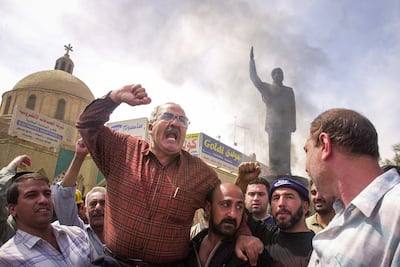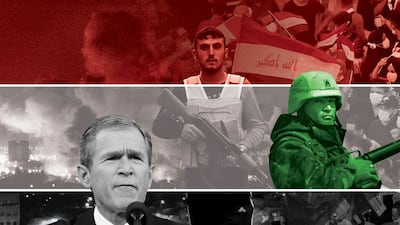In May 2022, former US president George W Bush rebuked Russian President Vladimir Putin for last year’s invasion of Ukraine. He got his words mixed up and condemned “the decision of one man to launch a wholly unjustified and brutal invasion of Iraq”. He quickly corrected himself, “I mean Ukraine”, chuckling and muttering “Iraq, too”.
Mr Bush is not the only one to make the connection – even if he did so accidently. Numerous commentators, particularly in the Middle East and Global South, have highlighted the US hypocrisy in condemning Russia’s invasion of Ukraine, and its calls for Mr Putin to be indicted by the International Criminal Court – when the US invaded Iraq in violation of the UN Charter, is not a signatory to the ICC, and committed human rights violations.
The 20th anniversary of the invasion of Iraq is an important moment to reflect on the impact of the war on the Iraqi people, the Middle East and the wider world.

The architects of the war promised it would change the world – Iraq, then under Saddam Hussein, would become liberated of a tyrant who mass murdered his people and invaded neighbouring countries, it would become a democracy, the region would be democratic, and there would at long last be peace with Israel.
The war did change the world – but not in ways its architects ever envisaged. It brought about not only regime change, but also state collapse, leading to Iraq’s descent into civil war, the establishment of extremist groups such as Al Qaeda in Iraq and ISIS, and the spread of Iran-backed militia. More than half a million Iraqis were killed – and millions displaced from their homes. Today, Iraq holds regular elections that serve to maintain in power a kleptocratic elite that squanders the country’s oil wealth, does not address environmental degradation, and ensures Iran’s influence.
Saddam’s Iraq had served as the Arab bulwark against Iran. The collapse of the Iraqi state accelerated Iranian expansionism, intensifying regional proxy wars, and the spread of sectarian conflict.
Rather than emerging as the vanguard of democracy for the region, Iraq’s experience has been held up as evidence by authoritarian regimes such as Syria’s that the alternative to tyranny is terrorism, and that security is more important than freedom.
The fallout from the region in terms of refugees and terrorists spilled out into Europe, fuelling the rise of far-right anti-immigration parties. It had a profound effect on the UK, where concern that a million refugees might make their way to Britain was a key factor in the 2016 Brexit vote to regain control of borders.
It also influenced American politics. In his bid for the US presidency, Donald Trump differentiated himself from establishment politicians by scorning those who supported the Iraq war, calling the invasion “the single worst decision ever made”, and mocking Mr Bush as “another real genius”.
As for peace between Arab countries and Israel, this has emerged with the Abraham Accords. However, the establishment of a Palestinian state – the stated policy of the US administration – is further away than ever from being realised.
In his recently launched book Confronting Saddam Hussein: George W Bush and the Invasion of Iraq, Melvyn Leffler describes how a fateful combination of fear, power and hubris led to America’s war in Iraq. He notes how it distracted the US from managing the rise of China and Russia’s revanchism; undermined its international reputation; and weakened the faith of Americans in their leaders.
The Iraq debacle damaged America’s image as the standard bearer of democracy, weakened its willingness to promote democracy, and hastened the end of America’s unipolar moment. The investment of so much blood, treasure and bandwidth in Iraq left America in a weaker position to deal with the emerging multipolar world.
The Russian invasion of Ukraine is being credited by many commentators with making “America great again”. It has consolidated the West. And the US is leading the West’s response to Moscow’s aggression, supplying Ukraine with weapons and imposing sanctions on Russia.
But how does this end? The ghosts of the Iraq war continue to haunt the global order. The war in Ukraine is pushing Russia, China and Iran closer together. And with Iran advancing its uranium enrichment, the US may find itself having to respond not only to conflict in Eastern Europe but also once again in the Middle East – and nuclear proliferation.


